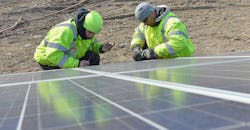Tariffs on Solar Panels Would Kill Jobs in the U.S.
By next month, the U.S. International Trade Commission, having unanimously ruled that American solar-panel makers are harmed by competition from Asian and other rivals, will recommend what tariffs or other import penalties the president should impose. The commission and the president need to understand that punishing Asian panel makers would do more than damage trade relations: It would also cripple the thriving U.S. solar-energy business.
Most solar panels sold in the U.S. are made in Asia. In the past several years, falling prices have driven stunning growth in U.S. installations—a 17-fold increase since 2008. Yet jobs in American solar have soared as well—in fact, 17 times faster than growth in the overall U.S. economy. That's because only about 15% of the more than 260,000 jobs in the American solar business are in manufacturing. Most are in installation and project development.
This remarkable growth in solar installations and jobs can continue—but not if tariffs raise prices too high for homeowners, businesses and utilities.
Few U.S. panel makers remain. Of the two that lodged complaints about foreign competition, Suniva and SolarWorld, the first is bankrupt and the other's German parent company has filed for insolvency. Against solid opposition from the rest of the U.S. solar business, they're asking for a tariff on photovoltaic modules that would almost double their price.
This demand should be flatly refused. If the administration wants to support U.S. solar technology, it would be better to promote research and development with an explicit subsidy. That way, any benefits could be secured without discouraging the rapid adoption of solar power and the employment gains that come with it.
Whatever the commission recommends, the decision will fall to President Trump. To this point, he hasn't been especially unfriendly to solar power. He's railed at wind power, while suggesting photovoltaic panels as a possible accessory for his wall along the Mexican border. But his favorite fuel is coal, with which solar is increasingly in competition. He might well see solar panels as a worthy candidate for tariffs.
The same preference might incline him to accept some other questionable ideas—including the Energy Secretary's recent recommendation that coal power be paid a subsidy for providing "reliable and resilient" energy, and changes to the tax code that (unless offset elsewhere) would weaken the incentives granted to solar developers.
Neither of those ideas would be nearly as destructive as tariffs. Trump may not care that the booming solar business is helping many states cut greenhouse-gas emissions—but he says he cares about jobs. If he means it, he'll keep the U.S. market open to imported solar panels.
